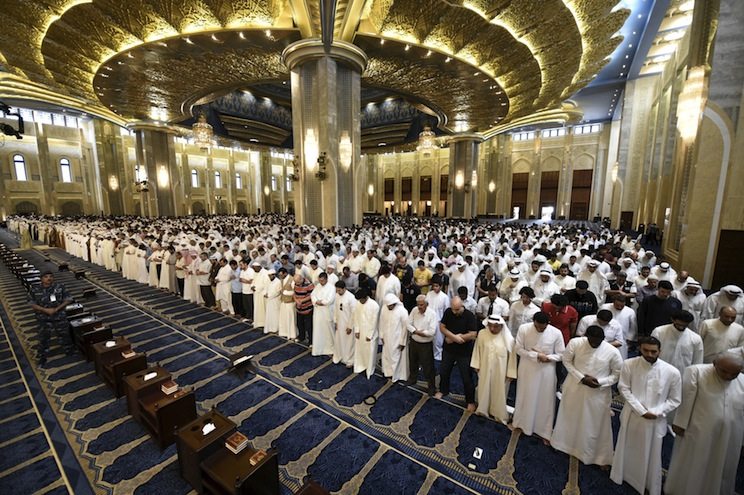A rare commercial public opinion poll completed in Kuwait in September exposes significant rifts in this Kuwaiti society about the major crises swirling around it. The survey was based on personal interviews by local staff, with strict assurances of confidentiality, among a random national sample of 1,000 adult Kuwaiti nationals.
Of all the Gulf Arab monarchies, Kuwait has the most active political life, including a fairly rambunctious elected parliament and relatively open discussion of controversial local and regional issues among its roughly 1.5 million citizens. So public opinion in this small oil-rich state, sandwiched between Iran and Iraq, has more than usual impact on its policy choices.
Given the results of this survey, Kuwait’s policies appear attuned to popular attitudes. Broad-based support for ISIS seems out of the question. At the same time, support for Islamist factions in the Syrian and Palestinian arenas appeals to the public, which helps explain Kuwait’s major financial contributions to this area.
Most of all, Kuwaiti citizens and government alike are acutely sensitive to potential problems with Iran, including the sectarian spillover in their own country. But neither popular nor official trust in the U.S.United States to protect Kuwait from Iran (as once happened with Iraq) is much in evidence today.
So Kuwait will almost certainly keep hedging its political bets – a tendency that has mostly worked for it in the past, with the glaring exception of Saddam’s invasion in 1990. It must maintain the delicate balancing act among its unfriendly neighbors, its uncertain foreign friends, and its own Islamist and sectarian cleavages.
Demographic Revelations: Sect, Youth, Education
In a region where full census data are very hard to obtain, one of the major findings is a simple demographic fact: a At least one-quarter and probably as many one-third of Kuwait’s citizens are Shi’ite. In this survey, 26 percent of respondents identified as “Shi’ite Muslim”; an additional 7 percent said “Muslim”; while the majority, 67 percent, said “Sunni Muslim.” This roughly conforms to the usual estimates, but provides unprecedented empirical evidence.
The survey also confirms that this is a young population overall. Fully 60 percent of adult nationals are under 35 years old. More surprising is that fewer than half (43 percent) of all adults have the equivalent of high school or higher education.
Three-Quarters View Iran Negatively, Expect No Rapprochement
Most Kuwaitis say that they have either a “fairly negative” (33 percent) or “very negative” (41 percent) opinion of Iran’s government. Iran’s regional ally Hezbollah also gets mostly poor (78 percent) ratings. But nearly one-fourth in Kuwait voice a positive opinion of both Iran and Hezbollah – a higher proportion, roughly reflecting the sectarian divide, than in all other Arab publics polled except Lebanon.
Asked about the recent nuclear agreement with Iran, a plurality of Kuwaitis (45 percent) label it a bad deal, compared with one-third who call it good – and one-fifth who admit they “haven’t heard or read enough to say.” On the broader issue of Iran, a mere 15 percent predict any improvement in its ties with Arabs over the next few years. Moreover, from a list of six possible foreign policy priorities for Kuwait’s government, “the conflict between Iran and Arab countries” ties for first place with “the conflict between sects or movements of Islam” – each with about 20 percent.
By comparison, “the conflict in Syria” gets only half as many votes for Kuwait’s number one current foreign policy priority. Yet around one-third of the public would like Kuwait to provide some form of support for the anti-Iranian Syrian opposition forces – either non-military (19 percent) or even through direct military intervention (11 percent).
Majority Also View Russia and U.S. Negatively, Along With Qatar
Asked their view of various governments in light of their recent policies lately, Kuwaitis give both Russia and the U.S. a statistically identical negative score: 76-77 percent. So the U.S. liberation of Kuwait in 1991 and removal of Saddam in 2003, while probably widely appreciated, do not translate into confidence in U.S. policies today. Just as remarkably, Kuwait’s nominal GCC ally Qatar receives an almost equally negative rating, at 61 percent.
To put these numbers in perspective, China and France each fare somewhat better, in the mid-50 percent negative range. And both Egypt and Turkey earn net positive ratings from a narrow plurality of the Kuwaiti public.
ISIS Overwhelmingly Unpopular, But Mixed Views of Other Militant Islamists
The extremist ISIS movement (Da’esh in Arabic acronym) garners favorable ratings from just 3 percent of Kuwaitis. In fact, asked to pick their first and then their second priorities for Kuwait’s foreign policy, “the conflict against Da’esh” scores higher than any of the five other choices offered.
In sharp contrast, the Muslim Brotherhood receives a positive rating from 31 percent of the Kuwaiti public. And its Palestinian offshoot, Hamas, enjoys a 52 percent favorable score. The Palestinian Authority in Ramallah trails behind, with 42 percent.
David Pollock is the Kaufman fellow at The Washington Institute and the director of Fikra Forum.

